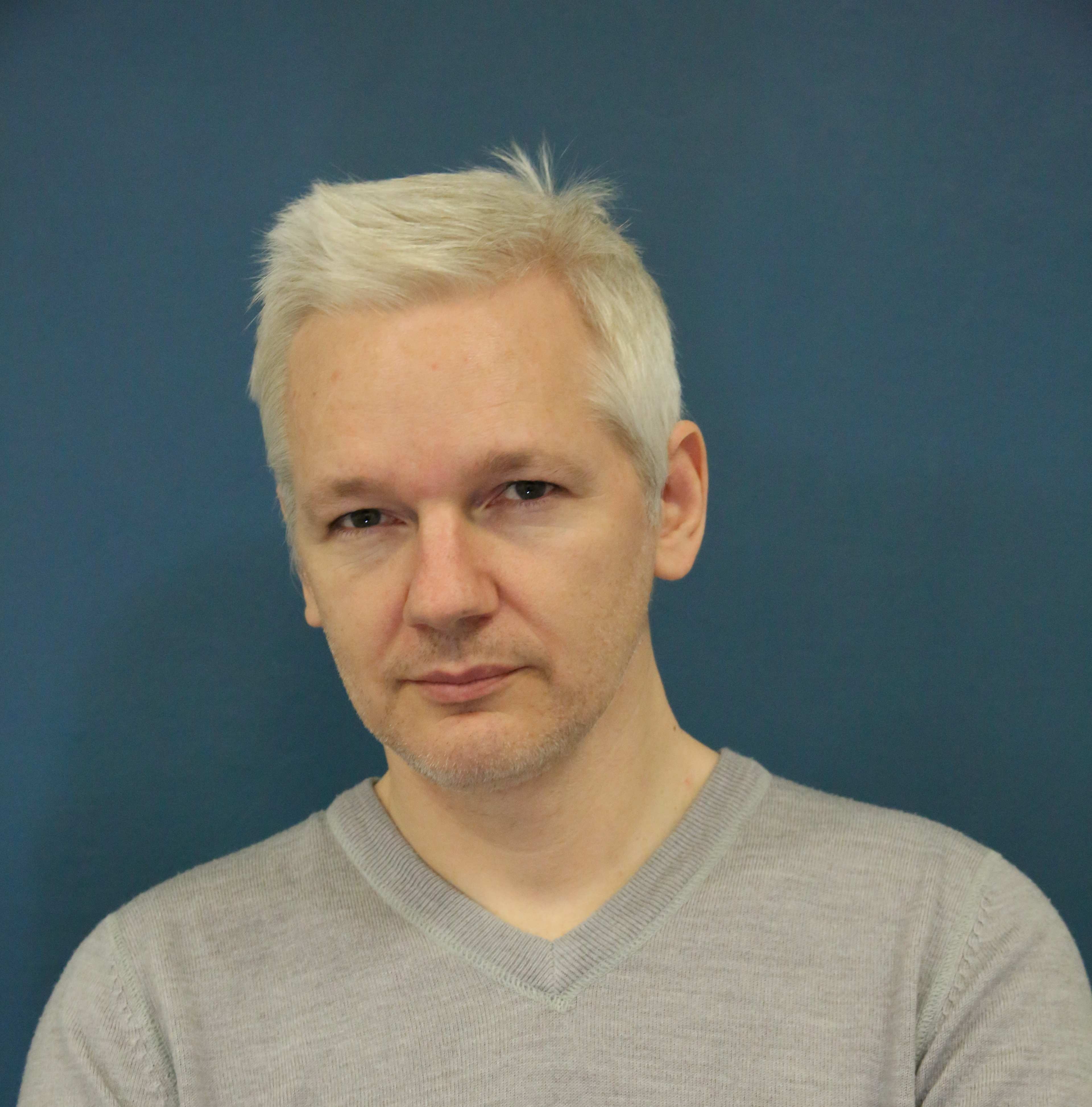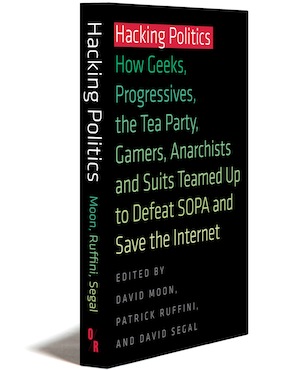Cypherpunks
Freedom and the Future of the Internet
With JACOB APPELBAUM, ANDY MÜLLER-MAGUHN and JÉRÉMIE ZIMMERMANN
"Cypherpunks is gripping, vital reading, explaining clearly the way in which corporate and government control of the internet poses a fundamental threat to our freedom and democracy."
—Oliver Stone
"Cypherpunks: Freedom and the Future of the Internet is an important wake-up call about a possible dystopian future, which is a technological reality now… While messengers of dangerous outcomes are always met at first with hostility and even mockery, history shows that we disregard such warnings as these at our peril." —Naomi Wolf
"Obligatory reading for everyone interested in the reality of our freedoms." —Slavoj Žižek
"The power of this book is that it breaks a silence. It marks an insurrection of subjugated knowledge that is, above all, a warning to all." —John Pilger
TweetBuy This Book
|
Paperback: $16/£11
|
E-book: $10/£7
|
Print + E-book: $20/£14
|
Bitcoin
Bitcoin is an international, decentralized digital currency. Learn more at bitcoin.org.
Paperback: $16 Bitcoin 
|
E-book: $10 
|
Print + E-book 
|
About the Book
Cypherpunks are activists who advocate the widespread use of strong cryptography (writing in code) as a route to progressive change. Julian Assange, the editor-in-chief of and visionary behind WikiLeaks, has been a leading voice in the cypherpunk movement since its inception in the 1980s.
Now, in what is sure to be a wave-making new book, Assange brings together a small group of cutting-edge thinkers and activists from the front line of the battle for cyber-space to discuss whether electronic communications will emancipate or enslave us. Among the topics addressed are: Do Facebook and Google constitute “the greatest surveillance machine that ever existed,” perpetually tracking our location, our contacts and our lives? Far from being victims of that surveillance, are most of us willing collaborators? Are there legitimate forms of surveillance, for instance in relation to the “Four Horsemen of the Infopocalypse” (money laundering, drugs, terrorism and pornography)? And do we have the ability, through conscious action and technological savvy, to resist this tide and secure a world where freedom is something which the Internet helps bring about?
The harassment of WikiLeaks and other Internet activists, together with attempts to introduce anti-file sharing legislation such as SOPA and ACTA, indicate that the politics of the Internet have reached a crossroads. In one direction lies a future that guarantees, in the watchwords of the cypherpunks, “privacy for the weak and transparency for the powerful”; in the other lies an Internet that allows government and large corporations to discover ever more about internet users while hiding their own activities. Assange and his co-discussants unpick the complex issues surrounding this crucial choice with clarity and engaging enthusiasm.
Publication November 2012 • 196 pages
Paperback ISBN 978-1-939293-00-8 • Ebook ISBN 978-1-939293-01-5
About the Authors

|
Julian Assange is the editor in chief of WikiLeaks and the author of When Google Met WikiLeaks. An original contributor to the cypherpunk mailing list, Assange is the author of numerous software projects in line with the cypherpunk philosophy, including the Rubberhose encryption system and the original code for WikiLeaks. An ‘ethical hacker’ in his teens, and subsequently an activist and internet service provider to Australia during the 1990s, he is the co-author (with Sulette Dreyfus) of Underground, a history of the international hacker movement. Julian is currently facing extradition charges to the US in Belmarsh prison London. |
Jacob Appelbaum is a staff research scientist at the University of Washington, and a developer and advocate for the Tor Project, which is an online anonymity system for everyday people to fight against surveillance and against internet censorship.
Andy Müller-Maguhn is a long time member of, and former spokesman for, the Chaos Computer Club in Germany. A specialist on surveillance he runs a company called Cryptophone, which markets secure voice communication devices to commercial clients.
Jérémie Zimmermann is the co-founder and spokesperson for the citizen advocacy group La Quadrature du Net, the most prominent European organization defending anonymity rights online and promoting awareness of regulatory attacks on online freedoms.
Read an Excerpt
AN EXCHANGE FROM CYPHERPUNKS:
JULIAN:
I want to look at what I see as a difference between a US cypherpunk perspective and the European perspective, which I think is quite interesting. The US Second Amendment is the right to bear arms. Just recently I was watching some footage that a friend shot in the US on the right to bear arms, and above a firearms store it says ‘Democracy, Locked and Loaded,’ and that’s the way that you ensure that you don’t have totalitarian regimes – that people are armed and if they are pissed off enough, then they simply take their arms and they retake control by force. Whether that argument is still valid now is actually an interesting one because of the difference in the types of arms that have occurred over the past 30 years. So, we can look back to this declaration that code-making, providing secret cryptographic codes that the government couldn’t spy on, was in fact a munition, and this big war that we fought in the 1990s to try and make cryptography available to everyone, which we largely won.
JAKE:
In the West?
JULIAN:
In the West we largely won and it’s in every browser – it is now perhaps being back-doored and subverted in different kinds of ways. The notion is that you cannot trust a government to implement the policies that it says that it is implementing, and so we must provide the underlying tools, cryptographic tools that we control, as a sort of use of force, in that if the ciphers are good no matter how hard it tries a government cannot break into your communications directly. Maybe it can put a bug in your house or whatever.
JAKE:
Force of authority is derived from violence. One must acknowledge with cryptography no amount of violence will ever solve the math problem.
JULIAN:
Exactly.
JAKE:
And this is the important key. It doesn’t mean you can’t be tortured, it doesn’t mean that they can’t try and bug your house or subvert it some way but it means that if they find an encrypted message it doesn’t matter if they have the force of the authority behind everything that they do, they cannot solve that math problem. This is the thing though that is totally non-obvious to people that are non-technical and it has to be driven home. If we could solve all of those math problems, it would be a different story and, of course, the government will be able to solve those math problems if anyone could.
JULIAN:
But it’s just a fact. It just happens to be a fact about reality, such as that you can build atomic bombs, that there are math problems that you can create that even the strongest state cannot directly break. I think that was tremendously appealing to Californian libertarians and others who believed in this sort of ‘democracy locked and loaded,’ and here was a very intellectual way of doing it – of a couple of individuals with cryptography standing up to the full power of the strongest suit of power in the world. And we’re still doing that a little bit, but I wonder, I have a view that the likely outcome is that those are really tremendously big economic forces and tremendously big political forces, like Jérémie was saying, and that the natural efficiencies of these technologies compared to the number of human beings will mean that slowly we will end up in a global totalitarian surveillance society. By totalitarian I mean a total surveillance, and that perhaps there’ll just be the last free living people – and these last free living people are those who understand how to use this cryptography to defend against this complete, total surveillance, and some people who are completely off-grid, neo-Luddites that have gone into the cave, or traditional tribes-people. And these traditional people have none of the efficiencies of a modern economy so their ability to act is very small. Are we headed for that sort of scenario?
JÉRÉMIE:
First of all, if you look at it from a market perspective, I’m convinced that there is a market in privacy that has been mostly left unexplored, so maybe there will be an economic drive for companies to develop tools that will give users the individual ability to control their data and communication. Maybe this is one way that we can solve that problem. I’m not sure it can work alone, but this may happen and we may not know it yet. Also it is interesting to see that what you’re describing is the power of the hackers, in a way – ‘hackers’ in the primary sense of the term, not a criminal. A hacker is a technology enthusiast, is somebody who likes to understand how technology works, not to be trapped into technology but to make it work better. I suppose that when you were five or seven you had a screwdriver and tried to open devices to understand what it was like inside. So, this is what being a hacker is, and hackers built the Internet for many reasons, also because it was fun, and they have developed it and have given the Internet to everybody else. Companies like Google and Facebook saw the opportunity to build business models based on capturing users’ personal data. But still we see a form of power in the hands of hackers and what is my primary interest these days is that we see these hackers gaining power, even in the political arenas. In the US there has been these SOPA (Stop Online Piracy Act) and PIPA (Protect IP Act) legislations – violent copyright legislation that basically gives Hollywood the power to order any Internet company to restrict access and to censor the internet.
JULIAN:
And banking blockades like the one we’re suffering from.
JÉRÉMIE:
Exactly. What happened to WikiLeaks from the banking companies was becoming the standard method to fight the evil copyright pirates that killed Hollywood and so on. And we witnessed this tremendous uproar from civil society on the Internet – and not only in the US, it couldn’t have worked if it was only US citizens who rose up against SOPA and PIPA. It was people all around the world that participated, and hackers were at the core of it and were providing tools to the others to help participate in the public debate.
In the Media
The Guardian, March 6th 2014
Daily Californian, February 9th 2014
Computational Culture, November 21st 2013
Fuse Book Review, October 27th 2013
Immortal Muse, October 12th 2013
Vanity Fair, October 2013
Counterfire, September 13th 2013
h+, August 23rd 2013
Russia Today, July 9th 2013
Guardian, July 9th 2013
Der Spiegel, July 8th 2013
LiveMint, June 25th 2013
Pacific Standard, June 17th 2013
The Verge, June 7th 2013
New York Times, June 1st 2013
Smiley & West, May 6th 2013
Truthdig, April 28th 2013
Los Angeles Review of Books, May 6th 2013
The Rumpus, March 29th 2013
Reason.com, March 12th 2013
Reason.com, March 11th 2013
The Verge, March 7th 2013
BoingBoing, February 14th 2013
Real Time with Bill Maher, February 8th 2013
Publishers Weekly, January 7th 2013
The Wall Street Journal, December 19th 2012
The Morning Star, December 16th 2012
Publishers Weekly, December 11th 2012
The Guardian, December 7th 2012
Wired Italy, December 7th 2012
New Statesman, December 6th 2012
Mediabistro, December 6th 2012
Digital Book World, December 5th 2012
Das Erste Mediathek, December 3rd 2012
Salon, December 2nd 2012
BBC World Service, November 30th 2012
BBC News, November 30th 2012
Russia Today, November 30th 2012
Gawker, November 29th 2012
Firedoglake, November 28th 2012
CNN, November 28th 2012
The Daily Telegraph, November 28th 2012
The Daily Telegraph, November 28th 2012
Der Spiegel, November 27th 2012
Russia Today, November 26th 2012
Russia Today, November 26th 2012
The London Evening Standard, November 23rd 2012
New Statesman, November 22nd 2012
The Guardian, October 8th 2012
The New York Times, October 8th 2012






